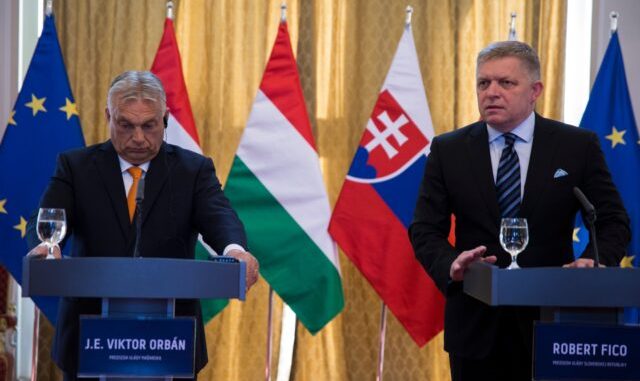
| Published May 2, 2025
Hungarian Prime Minister Viktor Orbán and Slovak Prime Minister Robert Fico jointly warned that admitting Ukraine into the European Union without unanimous consent from all member states could lead to the “destruction” of the EU. Speaking at a press conference in Bratislava, both leaders emphasized the importance of maintaining the EU’s unanimity rule, which grants each member state veto power over significant decisions, including the admission of new members.
“The EU will be strong if it can find agreement within the diversity of views present, the union will be strong if it respects the sovereign viewpoints of the member states and if it returns to respecting the values of democracy and the rule of law, as this is not always the case,” he added.
Mr Orbán also stressed the need for consensus on significant foreign policies, arguing that if the principle of unanimity is abandoned, member states could be dragged into war even if their citizens and governments were opposed to doing so, thereby eliminating the national sovereignty of EU countries.
The Hungarian PM, who frequently faces accusations of being autocratic, despite having come in and out of power over the past two decades depending on Hungarian elections, went on to mock the notion that Brussels is the protector of democratic values.
“It’s not that Brussels is the custodian of democracy, and they tell us what democracy is. It’s precisely the other way around, in Brussels there are bureaucrats,” he said, adding, “bureaucrats are not at all friends of democracy, bureaucrats are friends of bureaucracy.”
Prime Minister Fico asserted that eliminating the right of veto would be a step toward the dissolution of the EU, highlighting the need for the union to respect the diverse viewpoints of its member states. Similarly, Prime Minister Orbán cautioned that abandoning unanimity could result in member states being compelled into actions, such as military engagements, against their will, thereby undermining national sovereignty.
In addition to the threat of admitting a country with contested borders and thereby risking a full-scale conflict between Western powers and Russia, Mr Orbán has argued that allowing Ukraine into the bloc would imperil the Hungarian economy, particularly in the farming sector.
“We were not admitted because of our pretty eyes. The West decided to admit Hungary, Poland, the Czech Republic, and Slovakia because it was in their interest… and I am certain that admitting Ukraine would not serve our interests,” the populist leader said on Monday.
Both leaders expressed support for efforts by U.S. President Donald Trump to negotiate an end to the conflict in Ukraine and opposed military operations they believe would prolong the war. They also raised concerns about the potential economic impact of Ukraine’s EU membership, particularly on the agricultural sectors of Hungary and Slovakia.
This joint stance by Hungary and Slovakia underscores the challenges facing the EU in achieving consensus on Ukraine’s membership, especially given the requirement for unanimous approval by all 27 member states. The situation reflects broader tensions within the EU regarding decision-making processes and the balance between collective action and national sovereignty.
The warnings by Hungary and Slovakia about the EU’s potential “destruction” if Ukraine is admitted without unanimous consent carry several key implications:
1. Defense of National Sovereignty
Conservatives often prioritize national sovereignty over supranational control. Hungary and Slovakia’s insistence on the unanimity rule aligns with the belief that no nation should be coerced by a majority into decisions—especially ones involving war, immigration, or economic burdens. Forcing Ukraine’s entry without full consent is seen as EU overreach.
Implication: Weakening the veto power could set a precedent where individual nations lose control over their foreign policy and security, potentially dragging them into unwanted conflicts.
2. Opposition to Forced Integration
The EU has steadily pushed for deeper integration. Conservatives are wary of this trend, particularly when it bypasses democratic safeguards. Admitting Ukraine under pressure or with procedural shortcuts feeds fears of an unaccountable, bureaucratic EU elite overriding democratic checks.
Implication: It reinforces skepticism that the EU is evolving into a centralized superstate, ignoring the unique interests of its members.
3. Security and Economic Concerns
From a pragmatic conservative view, Ukraine’s entry poses security risks (given its ongoing war) and economic challenges—especially for nearby nations like Hungary and Slovakia with vulnerable agricultural sectors.
Implication: There’s concern that the EU might prioritize ideological or geopolitical goals over practical consequences for member states’ economies and stability.
4. Support for Alternative Peace Initiatives
The article notes both Orbán and Fico expressed support for Donald Trump’s efforts to negotiate peace in Ukraine. This reflects a conservative preference for diplomacy over prolonged conflict and skepticism toward the EU’s and NATO’s increasingly militarized posture.
Implication: It suggests a split in the West, where some leaders prefer negotiated settlements to continued military engagement.
5. Cultural and Identity Preservation
Ukraine’s admission might also be viewed as a cultural risk—introducing a large, war-affected population could impact migration, social cohesion, and cultural balance within the EU.
Implication: Conservatives might see this as part of a broader pattern of liberal-globalist policies that dilute European cultural identities.
Overall Takeaway:
Hungary and Slovakia’s warning highlights deep conservative concerns about the EU’s direction—particularly its shift toward centralization, erosion of national sovereignty, and willingness to bypass democratic consensus. For conservatives, forcing Ukraine’s admission without unanimous approval would not only threaten the EU’s internal cohesion but also set a dangerous precedent of sidelining member nations in favor of top-down political agendas. It reinforces calls to protect national interests, uphold the veto, and prioritize peace and pragmatism over ideological expansion.
SOURCES: BREITBART – Slovakia and Hungary Warn Brussels Risks ‘Destruction’ of EU if Ukraine Admitted Without Unanimous Consent
THE INDEPENDENT – Orbán says Hungary will block EU membership negotiations for Ukraine at a crucial summit this week
BARRON’S – Hungary, Slovakia Warn Against Changes To EU Unanimity Rule





Be the first to comment